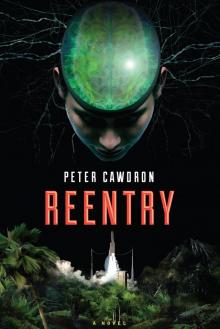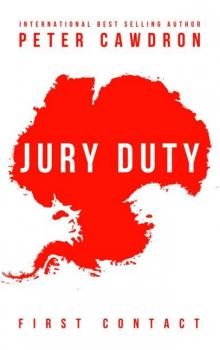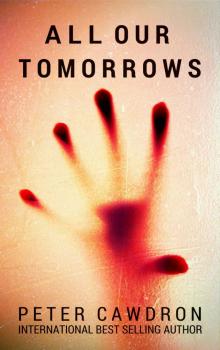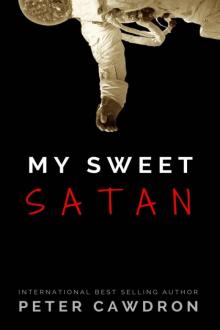- Home
- Peter Cawdron
Shadows Page 9
Shadows Read online
Page 9
“It's OK,” she said calmly.
She felt all his weight shift to her left hand as he let go and grabbed at her shoulder.
The platform swayed, coming loose from the wall and twisting out into the shaft before falling forward. Susan pushed off with her legs, trying to get free from the twisted wreckage as it fell. She drove hard with her thighs, driving them as hard as she could and springing out as the twisted strands of steel glanced against the rope, threatening to tangle them.
One of the platform struts lower down still held, and the landing fell no more than twenty feet before slamming back into the wall. Had they still been on the landing they would have been thrown headlong down the shaft, catapulted toward the deep. Susan was shaking, realizing that had the rope become caught, they would have all be dragged into the abyss, him, her and the men above.
The two of them dangled against the rough concrete for a few seconds before frantic arms began pulling them up to the hydroponics level.
“You're OK,” she said, unable to say anything more as water washed over them. “You're OK.”
The boy was straddling her, with his legs wrapped around her waist and his one good arm reaching around her back.
Hands reached down from above, grabbing at their coveralls and lifting them to safety.
Chapter 08: Aftermath
“Please stay,” James said as Susan tied a rope around her waist and prepared to climb out onto the remains of the staircase.
“I can't. I've got to find my Mom and Dad. I need to make sure they're OK.”
“We'll look after James,” one of the men said. “He'll be fine.”
Water no longer cascaded down through the silo. Someone had sealed the busted water main, but water still dripped from the stairs above. The men in the hydroponics section were already thinking about repairs. They understood how vital the stairs were and how they needed to be restored. They'd begun looping sections of rope around the twisted wreckage hanging from the wall of the shaft so it couldn't fall any further and were beginning to haul the landing back up. Susan didn't know how they'd secure the platform or if it could be repaired, but she had no doubt about the tenacity and resourcefulness of her fellow silo-dwellers. They'd think of something. They wouldn't be content to see the lifeline between levels severed.
Susan took a run up, leaping out across the gap and grabbing hold of the stairs. The metal frame shook under her sudden weight, but held. She untied the rope and James pulled it back.
“You take care, Susan,” he called out.
“You too, James.”
Water dripped on her head as she worked her way around the spiral staircase moving up top. James watched until she looped out of sight above him. He was a good kid. She didn't have the heart to ask him about who the other boy was that had fallen to his death. They had to have known each other. She knew that harsh reality would catch up with him eventually, but for now the focus on survival was a good distraction. There would be time to mourn later.
As she approached the water treatment plant on level eighteen she could see work teams moping up the mess from the burst pipes. Flashes from an arc welder stuttered through the poorly lit floor like lightning. There was lots of noise, lots of yelling. Susan went on quietly, unnoticed. Above eighteen, the stairs were dry, making the going easier.
The stairs beyond sixteen had been crushed by the falling slab from the dome. A tangle of metal lay squished against the concrete wall. Someone had rigged a rope at waist height across the fifteen foot gap. Susan used the rope to steady herself as she crept over the tangled remains. She tried not to look down. The curve of the stairs immediately below her were at least forty feet away. On the other side of the gap, the bolts anchoring the stairs to the wall had been severed by the impact, and that stretch of stairs, though intact, swayed back and forth with each step. Susan crept gingerly up to a secure section of the old stairs.
For the first time, she wondered about Barney and Charlie, surprised she'd thought of them in that order. She figured they were probably still down around IT on level thirty-four. She peered over the edge, looking at the devastation within the shaft, hoping they were OK.
The stairs around her were deathly quiet. There was plenty of noise down low, but where she was, the stairs were almost empty. Most people, it seemed, were keeping to their levels, probably repairing damage from the quake. She could hear considerable commotion somewhere above. As she approached level twelve she realized the noise was coming from the garments section so she quickened her pace.
To her horror, she could see the turnstile leading onto the level had been crushed by the floor above. The entire eleventh floor had fallen, cutting the height of the twelfth floor to just a few feet, barely a crawl space. There were work crews carting people out onto the landing, dragging them out of the darkness on blankets. With faces caked in concrete dust contrasted with scarlet red wounds, the injured looked like clothing mannequins.
“Mom,” she cried running up the stairs toward the rescuers.
Sheriff Cann was there, directing the recovery effort. He saw her and stopped her, holding out his hand.
“Sue,” he said. “I can't let you go in there. The level is too unstable. The entire floor could collapse at any moment.”
“My mother,” she pleaded, steeling herself to push past him and rush onto the floor.
Several rescuers crawled out covered in fine white dust. They were wearing hardhats with flashlights taped awkwardly on one side.
“Couldn't see anyone else,” the lead man said. “Chalmers and Davies are digging out the crew trapped by the loom, but there's no other responses to our calls.”
“How bad?” the sheriff asked, and Susan could see he struggled to form an entire sentence. In all his days, he'd probably never seen a disaster of this magnitude before.
“The rear section of the floor has pancaked. Anyone that's down there is gone.”
Susan was shaking.
Sheriff Cann turned to her. He was holding a clipboard and pencil.
“What's your mother's name?”
“Helena Claver.”
The sheriff studied his notes.
“Claver with a C,” Susan added, peering at the bloodstained sheet of paper and the hastily written notes.
“She's OK,” he said. “She's one of the haulers, taking people up to the cafeteria. We're using the open area as a makeshift hospital.”
“Thank you,” she said, leaning in impulsively and kissing him on the cheek.
“Your dad works in the farms, right?” he asked. “He should be fine. I've not heard any damage reports from there yet.”
Yet, was the main word she noted in his comment. In a time of such chaos, there had to be such caveats, she understood that, but the uncertainty made the suspense hard to bear.
Susan breathed deeply, saying, “What happened, sheriff?”
“Don't rightly know just yet, but all hell's broken loose. We've got fires in the refinery, flooding on at least four levels and two crushed levels that I know about. IT lost power. We've got emergency power on all other levels, but IT is dark. I'm not hearing anything from them.”
Susan swallowed the lump in her throat.
“But no news isn't necessarily bad news,” he added. “It's going to take some time to sort things out. We'll get through this.”
Susan told him what little she knew from the hydroponics level and the water recycling plant and then headed up to the cafeteria to find her mother. She came across a young man assisting an elderly woman with a broken leg. Between them, they took turns supporting her, helping her up the stairs. She wasn't sure how long it took to climb those last few levels, but she figured at least eight hours had passed since the initial incident. When she finally reached the top of the grand staircase she could see where the dome had cracked, losing at least half of its structure. Angry bedrock sat behind the broken dome, a dark scar marred the jagged rock.
There were hundreds of people in the cafeteria. The wounded w
ere lying on the tables and benches. There were a handful of doctors and nurses from the clinic on level five, moving between the injured. She left the boy and the elderly lady by the serving line which has been transformed into a triage point.
Susan scanned the crowd, looking at the downtrodden faces, many of them bloodied, with homemade bandages wrapped around their arms or legs, their hands or head. She stepped over those leaning against the wall. Some people curled up on the marble floor, exhausted from all they'd been through.
“Sue!”
She turned and saw her mother standing there in blood-soaked coveralls.
“Mom,” Susan cried, stepped across the wounded to get to her mother and hug her. Her mother's forearm had been bandaged but other than that she looked OK. The blood must have been from someone else. “Oh, Mom, it’s so good to see you.”
They sat down against the wall, ignoring the hard, cold floor.
“What happened?” Susan asked.
“We thought it was just us,” her mother began. “The roof caved in. Large blocks of concrete fell from the ceiling. I managed to get under the cutting desk. The lights went off and people started screaming. I ... I don't even know quite how I ended up here.”
Susan looked into her mother's eyes, they were dilated. She was in shock.
“You made it, Mom,” she said, hugging her again. “It's OK, you made it.”
“Have you heard from Dad?” her mother asked.
“I ran into Sheriff Cann, he said the farms are fine. They haven't had any major problems. Dad's OK, Mom.”
It wasn't that simple, and she knew it, but at that point, her mother needed assurance so Susan provided it, even though she knew there were doubts. There were always doubts. Susan preferred to think she was guessing rather than lying. Right now, her mother needed to know he’d be fine. She held her trembling hand, hurt to see her mother so badly shaken.
They sat there in silence for a while, looking at the wall screen. The broad hill that dominated their view of the outside world had collapsed on one side, crumbling into a hole. Clouds of smoke billowed in to the air from beyond the rubble, obscuring their view of the distant, crumbling buildings. The air looked rank, with a sickly yellow tinge unlike anything she'd seen before.
Sitting there, Susan remembered Charlie's excitement at seeing a winged aircraft a few days before. She'd found it hard to believe he'd seen anything at all, but after seeing the secret sub-level within IT and its books on the world-before she wasn't so sure of her insular silo anymore.
The setting sun cast long shadows through the billowing clouds, making it seem as though the earth had opened beyond the hill and swallowed some other silo. Something was causing the smoke, something was burning with tremendous ferocity. She wondered about the lives that had been lost. Was it really an entire silo just like theirs? What had happened? How could a silo be destroyed so suddenly and violently?
“What could have caused this?” Susan asked to no one in particular.
Her mother didn't answer. Susan realized she and Charlie probably understood more than anyone else at that point. No one would dare believe there had been another silo just over that devastated ridge. Susan wondered how many silos there were. If there were two, there could be three, four, five, a dozen. She had no reason to settle on any particular number, but even just the knowledge of two silos was enough to transform her outlook on life. She didn't know how to describe this to anyone else. Who would believe her and Charlie? No one. And yet there were others that knew. Hammond had to know, and possibly Barney.
Her mother coughed, snapping her back to reality.
“Are you OK, Mom?”
Her mother turned to her and nodded.
“I'll get you some water.”
“Thanks,” her mother replied weakly.
Someone had set up a water station along with a crate of fruit over by the sheriff's office. Susan hadn't realized how hungry and dehydrated she was, which was ironic given her clothes were still damp. She had a drink and munched on an apple as she walked back to her mother with a bottle of water and a peach.
“Thank you,” her mother said, taking the fruit and water from her.
In the distance, Susan could hear someone crying out in agony, yelling for help. Susan could see the injured lying everywhere. A doctor moved between people, carrying what looked like a first-aid kit.
“I should ...”
“Yes,” her mother said. “You should help.”
Susan walked over to the doctor as she leaned over a patient lying on the bench beside one of the tables. There were so many injured people, by her estimates they numbered into the hundreds. Blood stained the floor, making the marble slippery as Susan stepped carefully between the wounded. Two doctors and three nurses couldn't cover several hundred patients.
Susan stood on the edge of the doctor's vision and said, “Is there anything I can do to help?”
“You want to help?” the doctor said, sounding exasperated. She didn't look up from stitching a bleeding wound.
“Yes,” she replied, noting the sense of hopelessness in the doctor's voice. At that moment, what seemed like a good idea felt stupid, and she was suddenly aware of how inadequate she was in this regard. She might have been willing, but she wasn't able.
“Can you sew?”
To Susan, the question seemed irrelevant, and yet she couldn't answer with a simple yes. She felt intimidated both by the doctor and the enormity of the disaster.
“My mother works the looms. She taught me to mend from an early age.”
“OK,” the doctor replied, still not looking up from her patient. “You're on lacerations, that's the group nearest the wall-screen. We've got too many crush victims to tend to them. They're all yours.”
Susan stood there confused, not making the connection in her mind.
The nurse assisting the doctor looked up, adding, “Take them one-by-one into the kitchen and wash their wounds thoroughly in warm soapy water. Don't let the water sit. Make sure it's constantly running. Dry and bind their wounds using anything you can. You'll find a bunch of bandages on the counter by dry-storage, but I doubt there will be enough.”
The nurse paused, thinking for a moment before adding, “Deep cuts may require stitches. Sterilize your needle over a flame. Other than that, sewing up a wound is just like mending torn coveralls ... Oh, and wash your hands and arms thoroughly between patients. Any questions?”
Susan shook her head, more in dismay than to say no.
“Call me if you need help,” the nurse said, tossing a small package over to her.
Susan caught the package. For a moment, she simply stared at the contents through the clear plastic. There was a single compression bandage, a couple of gauze pads, scissors, medical tape, a roll of surgical thread and a couple of needles.
The patient before the doctor writhed in pain, crying out in agony. The nurse pinned his shoulders as the doctor kept working away on the wound. A metal clamp slipped and fell to the marble floor. Blood squirted from a severed artery, spraying the doctor's apron as she fought to control the bleeding.
Susan looked over at the mess of bodies in front of the wall-screen and figured she didn't know what she was doing so she might as well start at the front and learn as quick as she could. This wasn't what she'd meant when she offered to help. She thought she would sent to get fresh water or would help move patients around. The prospect of dealing with serious injuries was daunting, but she was determined to do whatever she could to help ease the suffering.
Stepping between people lying on the ground, Susan made her way to a young boy with deep cut running down his forearm. He was sobbing quietly, looking at his arm.
“Come with me.”
Those three words seemed to be medicine in themselves, and not just for him. They instill confidence in her as well.
Over the next few hours, Susan realized the physical act of cleaning wounds was only part of the job. Having someone care for them was healing in itself, he
lping those injured to find the strength to endure.
Three more teenagers, a girl and two boys joined her. She recognized them as being a couple of years younger than her at school, but she didn't know them by name. They introduced themselves as Olivia, Steve and Jamie. They clearly thought she was a nurse despite her dirty, bloody porter's coveralls and took their lead from her.
Together the four of them set up a system for treating those with less severe injuries. Steve and Jamie helped the injured to a large stainless steel kitchen sink normally used for preparing vegetables, while Susan and Olivia set to cleaning and bandaging wounds, all the while talking to the patients, finding out who they were, where they were from and how they'd been injured. Afterwards, one of the boys would assist the patients to the far wall, well away from where they'd been initially placed. Susan found a mop and bucket at the back of the floor and had the boys clean the bloodied floor as they went.
The overhead lights were bright. Ordinarily, there would have been numerous lights on in the kitchen, saturating the workbenches with light and leaving no shadows, but the quake must have damaged the wiring. Only a few lights worked, including the light directly over the sink. At first it didn't bother Susan too much, but after awhile she found her tired eyes failing in the stark contrast between light and dark. As she tended to her patients, she had to keep moving around, trying not to cast shadows over her hands. She needed to get a good look at each wound and would spend considerable mental effort distinguishing between muscle and sinew, bloodied fragments of concrete and wooden splinters. After a while, all she could focus on were the injuries. The faces that moved before her became incidental, secondary to their wounds. It took all her will to focus on the subtleties of each injury.
The night was long, and yet the moans and cries softened as the night wore on. Beneath the stark, electric lights within the kitchen, Susan had no awareness of time passing. A couple of the kitchen hands broke out coffee and gave it to the medical workers. Susan had only ever had coffee once before and was surprised by the rush it brought to her mind.

 Alien Space Tentacle Porn
Alien Space Tentacle Porn Reentry
Reentry Déjà Vu (First Contact)
Déjà Vu (First Contact) Wherever Seeds May Fall (First Contact)
Wherever Seeds May Fall (First Contact) But The Stars
But The Stars Trixie & Me
Trixie & Me Collision
Collision Jury Duty (First Contact)
Jury Duty (First Contact) Losing Mars
Losing Mars We Are Legion (van Helsing Diaries Book 2)
We Are Legion (van Helsing Diaries Book 2) Van Helsing's Diaries (Books 1-3): Nosferatu
Van Helsing's Diaries (Books 1-3): Nosferatu Shadows
Shadows 3zekiel (First Contact)
3zekiel (First Contact) Vampire (van Helsing Diaries Book 1)
Vampire (van Helsing Diaries Book 1) Xenophobia
Xenophobia All Our Tomorrows
All Our Tomorrows My Sweet Satan
My Sweet Satan Anomaly
Anomaly Monsters
Monsters